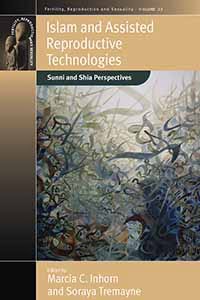How and to what extent have Islamic legal scholars and Middle Eastern lawmakers, as well as Middle Eastern Muslim physicians and patients, grappled with the complex bioethical, legal and social issues that are raised in the process of attempting to conceive life in the face of infertility? This path-breaking volume explores the influence of Islamic attitudes on assisted reproductive technologies (ARTs) and reveals the variations in both the Islamic jurisprudence and the cultural responses to ARTs.
Content
Glossary of Arabic, Farsi and Turkish Terms
Introduction: Islam and Assisted Reproductive Technologies
Soraya Tremayne and Marcia C. Inhorn
Part I: Islamic Legal Thought and ARTs: Marriage, Morality, and Clinical Conundrums
Introduction
Frank Griffel
Chapter 1. Constructing Kinship in Sunni Islamic Legal Texts
Thomas Eich
Chapter 2. Islamic Jurisprudence (Fiqh) and Assisted Reproduction: Establishing Limits to Avoid Social Disorders
Sandra Houot
Chapter 3. Controversies in Islamic Evaluation of Assisted Reproductive Technologies
Farouk Mahmoud
Part II. From Sperm Donation to Stem Cells: The Iranian ART Revolution
Introduction
Narges Erami
Chapter 4. More than Fatwas: Ethical Decision Making in Iranian Fertility Clinics
Robert Tappan
Chapter 5. The “Down Side” of Gamete Donation: Challenging “Happy Family” Rhetoric in Iran
Soraya Tremayne
Chapter 6. Gestational Surrogacy in Iran: Uterine Kinship in Shia Thought and Practice
Shirin Garmaroudi
Chapter 7. Human Embryonic Stem Cell Research in Iran: The Significance of the Islamic Context
Mansooreh Saniei
Part III. Islamic Biopolitics and the “Modern” Nation-state: Comparative Case Studies of ART
Introduction
Sean Brotherton
Chapter 8. Third-Party Reproductive Assistance around the Mediterranean: Comparing Sunni Egypt, Catholic Italy, and Multisectarian Lebanon
Marcia C. Inhorn, Pasquale Patrizio and Gamal I. Serour
Chapter 9. Islamic Bioethics and Religious Politics in Lebanon: On Hizbullah and ARTs
Morgan Clarke
Chapter 10. Assisted Reproduction in Secular Turkey:Regulation, Rhetoric, and the Role of Religion
Zeynep Gürtin-Broadbent
Notes on Contributors
Bibliography
Index
Book Reviews
RANIA KASSAB SWEIS, University of Richmond, in American Ethnologist, Volume 41 Number 1 February 2014 (PDF)
This groundbreaking volume is highly likely to become a point of departure for all future engagements with biotechnologies in the Middle East. The collection expertly reveals in vivid detail the local moral worlds of biotechnologies of life within the Islamic landscape. Unprecedented and unique, this book challenges both popular misconceptions and academic gaps in knowledge vis-Ã -vis new developments in bioscience and technology from theocratic Iran to secular Turkey.
–Aditya Bharadwaj, University of Edinburgh
Authors
Soraya Tremayne is the Founding Director of The Fertility and Reproduction Studies Group and a Research Associate at the Institute of Social and Cultural Anthropology, University of Oxford. Her publications include Managing Reproductive Life: Cross-Cultural Themes in Fertility and Sexuality (ed., 2001); Women As Sacred Custodians of the Earth? Women, Spirituality and the Environment (co-ed. with A. Low, 2001); Fertility and Reproduction, special issue of Journal of the Anthropological Society of Oxford (guest ed., 2000); Fatness and the Maternal Body: Women’s Experiences of Corporeality and the Shaping of Social Policy (co-ed. with Unnithan-Kumar, 2011).

